
Journal of Cultural Cognitive Science
Scope & Guideline
Fostering Dialogue Between Culture and Cognitive Science
Introduction
Aims and Scopes
- Cognitive and Cultural Interactions:
The journal emphasizes how cognitive processes are shaped by cultural contexts, examining the interplay between cognition and cultural practices. - Bilingualism and Multilingualism:
A significant focus is placed on the cognitive implications of bilingual and multilingual experiences, exploring how language proficiency influences cognitive abilities and social cognition. - Developmental Dyslexia and Literacy:
Research on developmental dyslexia, literacy acquisition, and the impact of different writing systems is a core area, looking at how cultural and linguistic factors affect learning outcomes. - Emotion and Social Cognition:
The journal investigates how cultural contexts influence emotional expression, recognition, and moral judgments, contributing to the understanding of social cognition across different cultures. - Embodiment and Gesture in Communication:
Studies on the role of gestures and embodied cognition in communication highlight how cultural practices shape cognitive representations. - Cross-Cultural Psychological Studies:
The journal promotes research that compares cognitive processes across cultures, providing insights into cultural variability in cognition.
Trending and Emerging
- Human-Machine Interaction and Creativity:
Recent studies exploring the intersection of human creativity and machine intelligence indicate a growing interest in how technology influences cognitive processes and creative expression. - Cross-Cultural Comparisons in Moral Judgments:
Research comparing moral judgments across cultures is gaining prominence, reflecting an increasing interest in understanding how cultural frameworks shape ethical reasoning. - Cognitive Ethnography:
There is a rise in cognitive ethnography studies that investigate cognitive processes within specific cultural contexts, providing richer insights into how culture influences cognition. - Dynamic Bilingualism and Cognitive Flexibility:
Emerging research focuses on the dynamic aspects of bilingualism, emphasizing cognitive flexibility and the adaptive strategies used by bilingual individuals in diverse contexts. - Cultural Influences on Emotional Processing:
Studies that examine cultural variability in emotional processing and recognition are increasingly common, indicating a trend towards understanding emotions as culturally situated phenomena.
Declining or Waning
- Traditional Literacy Studies:
There has been a noticeable decrease in studies solely focused on traditional literacy skills, as the journal has shifted towards more integrative approaches that consider cultural and cognitive dimensions. - Static Models of Bilingualism:
Research that relies on static models of bilingualism without considering dynamic interactions and contextual factors is becoming less prominent, as the journal increasingly values nuanced perspectives. - Narrow Psycholinguistic Approaches:
The journal is moving away from narrowly defined psycholinguistic studies that do not incorporate cultural context, favoring interdisciplinary approaches that blend cognitive science with cultural insights. - Generalized Emotion Recognition Studies:
Studies that explore emotion recognition without a cultural lens are less frequently published, indicating a trend towards more culturally contextualized research. - Overly Technical Linguistic Analyses:
There is a decline in purely technical linguistic analyses that lack cultural relevance, as the journal seeks to highlight the cognitive implications of linguistic phenomena.
Similar Journals
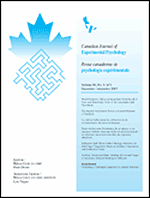
CANADIAN JOURNAL OF EXPERIMENTAL PSYCHOLOGY-REVUE CANADIENNE DE PSYCHOLOGIE EXPERIMENTALE
Transforming Psychological Science with Every IssueCanadian Journal of Experimental Psychology / Revue canadienne de psychologie expérimentale (ISSN 1196-1961, E-ISSN 1878-7290), published by the Canadian Psychological Association, serves as a vital resource in the fields of Experimental and Cognitive Psychology and general psychological research. With a respectable impact factor that places it in the Q3 category for both Experimental Psychology and miscellaneous Medicine (2023), this journal offers a platform for innovative research that furthers our understanding of psychological processes. Spanning years from 1993 to 2024, it connects researchers, professionals, and students to contemporary findings and methodologies, fostering a collaborative environment for the advancement of psychological science. Though it does not currently offer Open Access, the journal's commitment to quality and relevance in psychological research continues to make it an important part of the academic landscape, supporting the dissemination of knowledge within a global community.
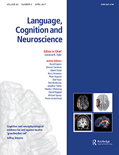
Language Cognition and Neuroscience
Transforming Language Studies Through Cognitive NeuroscienceLanguage Cognition and Neuroscience is a premier peer-reviewed journal published by ROUTLEDGE JOURNALS, TAYLOR & FRANCIS LTD, focusing on the intersection of linguistics, cognitive psychology, and neuroscience. Since its inception in 2013, this journal has established itself as a vital resource for researchers and scholars, contributing significantly to the understanding of how language is processed and represented in the brain. With its impressive rankings in various categories—Q1 in Linguistics and Language, Q2 in Cognitive Neuroscience, and Experimental and Cognitive Psychology—it caters to a diverse and interdisciplinary audience. The journal is accessible to readers worldwide, effectively communicating cutting-edge research and innovative methodologies in the field. Open Access options enable broader disseminations of knowledge, ensuring that significant findings reach both academic and practical applications. With a commitment to high-quality research, Language Cognition and Neuroscience continues to be an influential platform for advancing theories and practices within cognitive science and language studies.
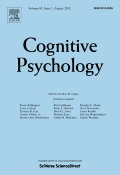
COGNITIVE PSYCHOLOGY
Exploring the Depths of Human CognitionCOGNITIVE PSYCHOLOGY is a premier academic journal published by Academic Press Inc. Elsevier Science, specializing in the dynamic and evolving field of cognitive psychology. With a significant history spanning from 1970 to 2024, this journal has established itself as a critical resource for researchers and professionals alike, boasting a distinguished ranking in the Q1 category across multiple disciplines, including Experimental and Cognitive Psychology, Neuropsychology, and Artificial Intelligence. Its impact factor, reflective of its influence and reputation within the academic community, positions COGNITIVE PSYCHOLOGY as an essential platform for disseminating cutting-edge research and theoretical advancements. Although it is not open access, subscribers gain exclusive insights into the latest findings that drive the field forward. The journal's commitment to fostering innovative research makes it an indispensable tool for those dedicated to understanding the complexities of human cognition.

JOURNAL OF EXPERIMENTAL PSYCHOLOGY-APPLIED
Bridging Theory and Practice in Cognitive ResearchThe JOURNAL OF EXPERIMENTAL PSYCHOLOGY-APPLIED, published by the American Psychological Association, is a premier outlet for cutting-edge research in the field of Experimental and Cognitive Psychology. With an impressive impact factor indicated by its Q1 ranking in 2023, this journal stands as a leading resource for scholars and practitioners, fostering a deeper understanding of the applications of psychological principles. With its extensive coverage from 1995 to 2024, the journal delivers a wealth of empirical studies, theoretical discussions, and methodological innovations that inform both academic learning and practical implementations in psychology. Although the journal does not offer open access options, researchers can gain insights into its influential findings through libraries or institutional subscriptions. Located in Washington, DC, it serves as a critical platform for disseminating high-quality research that bridges the gap between theory and real-world applications, supporting the advancement of knowledge in the vital area of human cognition and behavior.

JOURNAL OF PSYCHOLINGUISTIC RESEARCH
Cultivating Knowledge at the Crossroads of Language and PsychologyJOURNAL OF PSYCHOLINGUISTIC RESEARCH is a premier scholarly publication dedicated to the interdisciplinary exploration of language and cognition. Established in 1971 and published by Springer/Plenum Publishers, this journal serves as a vital platform for researchers in Experimental and Cognitive Psychology, Linguistics, and related fields. With an impressive reputation reflected in its 2023 Category Quartiles—Q3 in Experimental and Cognitive Psychology, Q1 in Linguistics and Language, and Q2 in Psychology (miscellaneous)—the journal ranks prominently within the Scopus database, reaching the 88th percentile in Language and Linguistics. Researchers and professionals have the opportunity to disseminate their findings effectively, enriching contemporary understanding of psycholinguistic phenomena through rigorous peer-reviewed articles. Although currently not an open-access journal, it provides extensive access options that cater to a global audience, ensuring that the latest research is readily available to those dedicated to advancing this dynamic field. We invite scholars, practitioners, and students to engage with this essential resource for fresh insights and innovative research methodologies.

Cognitive Processing
Elevating discourse in cognitive neuroscience and beyond.Cognitive Processing, published by SPRINGER HEIDELBERG in Germany, is a leading journal dedicated to advancing the understanding of cognitive processes through interdisciplinary research. With its ISSN 1612-4782 and E-ISSN 1612-4790, the journal covers a diverse range of fields including Artificial Intelligence, Cognitive Neuroscience, and Experimental and Cognitive Psychology, making it an invaluable resource for researchers and professionals alike. While it currently does not operate under an Open Access model, it is well-regarded within the academic community, holding a respectable impact factor and ranking in the Q2 and Q3 quartiles as of 2023. The journal aims to foster innovation and collaboration among scholars, presenting high-quality original research, reviews, and theoretical discussions that bridge the gap between cognitive science and its practical implications. With a convergence of research from 2005 to 2024, Cognitive Processing continues to play a critical role in the evolving landscape of cognitive science literature.
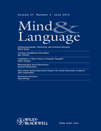
MIND & LANGUAGE
Unraveling the Complexities of Cognition and CommunicationMIND & LANGUAGE, published by WILEY, is a premier academic journal that has established itself as a leading platform for interdisciplinary research at the intersection of linguistics, philosophy, and cognitive science. With a noteworthy impact factor and a remarkable ranking in the top quartiles (Q1) for both Linguistics and Language as well as Philosophy, it reflects the journal’s robust contribution to the academic community, garnering attention from researchers and scholars worldwide. Since its inception in 1986, MIND & LANGUAGE has provided an avenue for exploring the complexities of language perception, cognitive processes, and the philosophical implications of linguistic studies. Its comprehensive scope ensures that it remains a critical resource for professionals and students alike who are engaged in the exploration of language's role in human thought and society. The journal's rigorous peer-review process guarantees the high quality and scholarly integrity of the published work, making it an essential addition to any academic library.

Language and Cognition
Bridging Language and Cognitive ScienceLanguage and Cognition is a premier peer-reviewed journal published by Cambridge University Press, dedicated to advancing the fields of language, linguistics, and cognitive psychology. With an ISSN of 1866-9808 and E-ISSN of 1866-9859, it has rapidly established itself as a pivotal resource for researchers, educators, and practitioners alike. Recognized for its rigorous scholarship, the journal holds a Q1 ranking in Linguistics and Language and a Q2 ranking in Experimental and Cognitive Psychology for 2023, reflecting its esteemed positioning within the academic community. Since transitioning to open access in 2023, it has broadened its reach, making cutting-edge research accessible to a global audience. The journal's emphasis on interdisciplinary studies ensures a comprehensive exploration of the interactions between language and cognitive processes, fostering deeper insights and fostering collaboration across domains. Researchers and professionals looking to stay at the forefront of advancements in these vital areas will find Language and Cognition an invaluable platform for disseminating their findings and engaging with contemporary debates.
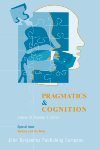
Pragmatics & Cognition
Unlocking the Secrets of Communication and CognitionPragmatics & Cognition, published by John Benjamins Publishing Co, is an esteemed journal that serves as a cross-disciplinary platform for the study of language, cognition, and context-dependent communication. With its ISSN 0929-0907 and E-ISSN 1569-9943, the journal has established a notable reputation since its inception in 1993, although its coverage spans various fields from behavioral neuroscience to linguistics and philosophy. Recognized for its scholarly contributions, it holds impressive Scopus rankings, significantly within Linguistics and Language, where it ranks in the 63rd percentile among peers. Although it currently maintains a Q4 designation in Behavioral Neuroscience and a Q1 in Linguistics and Language as of 2023, the journal appeals to a diverse audience addressing the intricate relationships between language use and cognitive processes. As researchers and academics navigate this evolving landscape, Pragmatics & Cognition remains pivotal in fostering essential dialogues and advancing knowledge in the interdisciplinary field, providing rich content that is both insightful and relevant.

Journal of Cognition and Culture
Bridging Minds and Cultures: A Scholarly JourneyThe Journal of Cognition and Culture, published by BRILL, stands as a pivotal resource in the fields of Cultural Studies, Social Psychology, and Experimental and Cognitive Psychology. With an ISSN of 1567-7095 and E-ISSN of 1568-5373, this scholarly journal has been contributing to the academic discourse since 2001 and continues to provide insights into the interplay between cognitive processes and cultural phenomena. Based in the Netherlands, it boasts impressive rankings, including Q2 in Arts and Humanities (Miscellaneous) and Q1 in Cultural Studies for 2023, reflecting its significance in addressing complex cognitive and cultural issues. Although it operates under a traditional access model, the journal's commitment to rigorous peer review and high-impact research ensures its relevance and authority in the field. Researchers, educators, and students alike will find the articles and studies published herein an invaluable addition to their understanding of how cognitive functions shape, and are shaped by, cultural contexts.